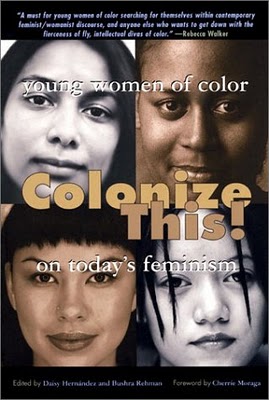From her essay “The Black Beauty Myth,” which appears in the anthology Colonize This! (published in 2002):
As a women’s studies major in college, body image was something we discussed almost ad nauseam. It was really cathartic because we embraced the personal as political and felt safe telling our stories to our sister feminists. Whenever body image was researched and discussed as a project, however, black women were barely a footnote. Again, many white feminists had failed to step out of their reality and see beyond their own experiences to understand the different ways in which women of color experience sexism and the unattainable beauty ideals that society sets for women.
Discussions of body image that bother to include black women recognize that there are different cultural aesthetics for black and white women. Black women scholars and activists have attacked the dominance of whiteness in the media and illuminated black women’s tumultuous history with hair and skin color. The ascension of black folks into the middle class has positioned them in a unique and often difficult position, trying to hold onto cultural ties while also trying to be a part of what the white bourgeois has created as the American Dream. This not only permeates into capitalist material goals, but body image as well, creating a distinctive increase in black women’s body dissatisfaction.
White women may dominate pop culture images of women, but black women aren’t completely absent. While self-deprecating racism is still a factor in the way black women view themselves, white women give themselves too much credit when they assume that black women still want to look like them. Unfortunately, black women have their own beauty ideals to perpetually fall short of. The representation of black women in Hollywood is sparse, but among the most famous loom such beauties as Halle Berry, Jada Pinkett Smith, Nia Long, Iman and Angela Bassett. In the music scene there are the young women of Destiny’s Child, Lauryn Hill and Janet Jackson. Then, of course there is model Naomi Campbell and everyone’s favorite cover girl, Tyra Banks. Granted, these women don’t necessarily represent the waif look or heroin chic that plagues the pages of predominately white fashion and entertainment magazines, but come on. They are still a hard act to follow.

